If You Don’t Read This Paper, We’ll Squirt This Cat
We’ve heard the story so many times by now it’s almost funny: Awesome thing began, COVID-19 thwarted awesome thing a few hours later.
Among such things: the CloudTop Comedy Festival, which kicked off in 2019 at various venues in Santa Fe and brought together numerous bigger-name comics such as Fortune Feimster, Maria Bamford, James Adomian, Kellen Erskine and Naomi Ekperigin with a slew of Santa Fe joke-makers. According to founder and organizer Jessica Baxter, roughly 1,000 tickets were sold that year (a pretty huge number in Santa Fe) and things were looking pretty swell for 2020, too. Then everyone got sick. The festival is back this year, however, and bigger than ever: CloudTop takes over the Santa Fe Farmers Market Pavilion, Violet Crown Cinema, Jean Cocteau Cinema, Altar Spirits and the Sage Social Kitchen+Bar next week with more local, regional and national comics than we could possibly print in one story. It’s huge.
Baxter had conceived the idea a million years ago, and following a stint at Indiana University (where she picked up her master’s in arts administration) and another as the Santa Fe Opera’s director of special events, she finally pulled the trigger.
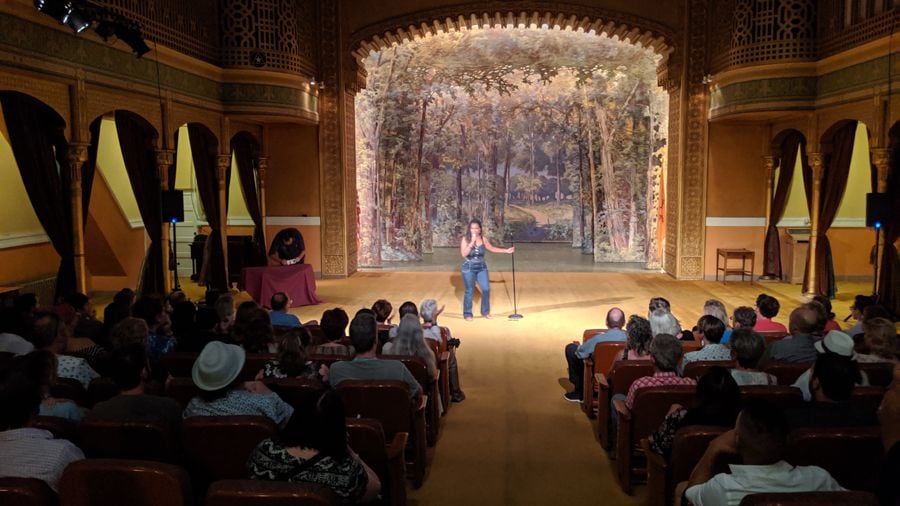
From the inaugural CloudTop Comedy Festival, which began in 2019 and has been on hold thanks to stupid COVID-19. (Jessica Baxter/)
“I had this dream to put on a fest for a long time,” Baxter tells SFR. “I feel like with the advent of Netflix, comedy was something that people used to do more occasionally, but all you have to do now is click that button and there’s an endless stream of brilliant comedians at our fingertips.”
What’s better about seeing a comic live, according to Baxter, is the unique experience.
“There are little cutaway jokes, side jokes, interplay with the audience that you don’t get in a special, and I actually think much of that is the best part,” she says. “There’s a sense of place, a sense of coming together for this special experience, and it happens only once, then it’s over.”
Indeed, that sense of urgency is where comedy lives, and being there in person and with others takes the experience to another level. The festival model has also catapulted lesser-known comics to prominence. Take Korey Herrera (Cochiti Pueblo and Navajo), who had only been doing comedy four months when he was selected for the 2019 CloudTop fest.
“It was a fast-track to understanding comedy in general,” Herrera says. “I only had five minutes then, and I learned how to build up my time—and it was really helpful for me to meet other comedians.”
Herrera, who recently released his debut comedy EP, All Rezzed Out, will perform at the upcoming fest as part of the Indigenous Showcase with Adrianne Chalepah, Josh Fournier and Ricardo Caté. He says comedy was just a daily occurrence when he was growing up.
“One thing was that our elders, our Navajo family, really roasts us when we’re kids,” Herrera explains. “There are so many comedians in our communities who’ve never done comedy, and so many people who I feel would do really well.”
Elsewhere in the festival, you’ll find appearances from members of local troupe Wayward Comedy (more on that later) plus notable locals including Miljen Aljinovic, Quinn Fontaine and Carlos Medina.
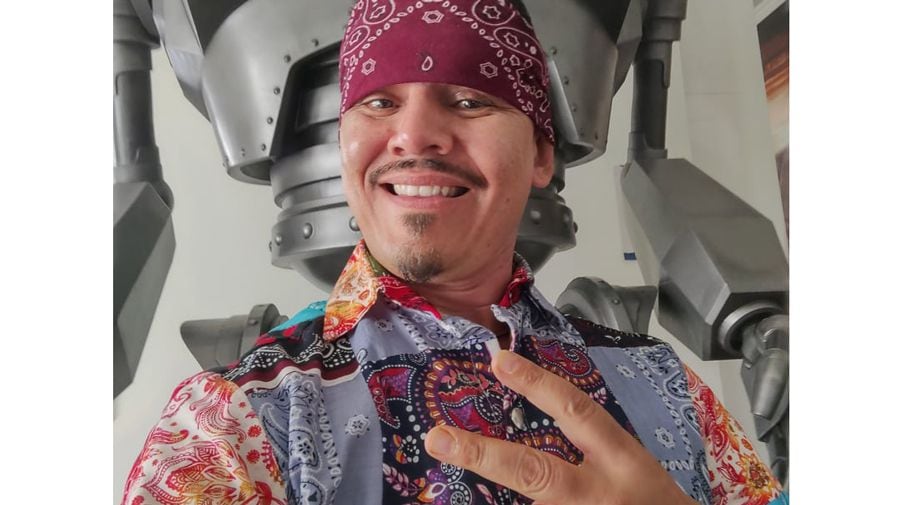
Carlos Medina (Courtesy Carlos Medina/)
“Yeah, I guess you could say I’m a goofball kid,” Medina tells SFR. “My girlfriend just heard me say that and said, ‘You still are!’ But comedy was just a part of life growing up and working in construction. I think it was just part of making a brutal day go by easier.”
Medina, who is also an accomplished mariachi, has gained notoriety as the Norteño-focused comic, which is to say his representations of Nuevo Mexicano culture combined with his popular “What Are You Doin?” YouTube videos have earned him a bit of celebrity, as have his various characters such as Graviel De La Plaga. At CloudTop, he’ll be one of the more recognizable names.
“A good friend of mine—Lee Zlotoff, who created MacGyver, has always given me the advice: ‘The more unique, the more appealing to the masses.’ He says to never give up the idea you have, because one day it might be huge.”
Speaking of which, festival headliners Beth Stelling and Hari Kondabolu are big gets for our sleepy little town. Stelling might best be known for her HBO special Girl Daddy, though appearances on late night television certainly haven’t hurt her profile. Most likely, you know Kondabolu as the guy who took on The Simpsons’ Apu with his 2017 documentary film, The Problem with Apu. While that resulted in major changes at the enduring animated sitcom, it is, of course, hardly the only thing for which Kondabolu is known. He’s a standup and writer, not to mention co-host of the Politically Re-Active podcast with his fellow comic and CNN contributor W Kamau Bell. In other words, he was worth tracking down tirelessly and through at least four emails for a bit of the old Q&A.
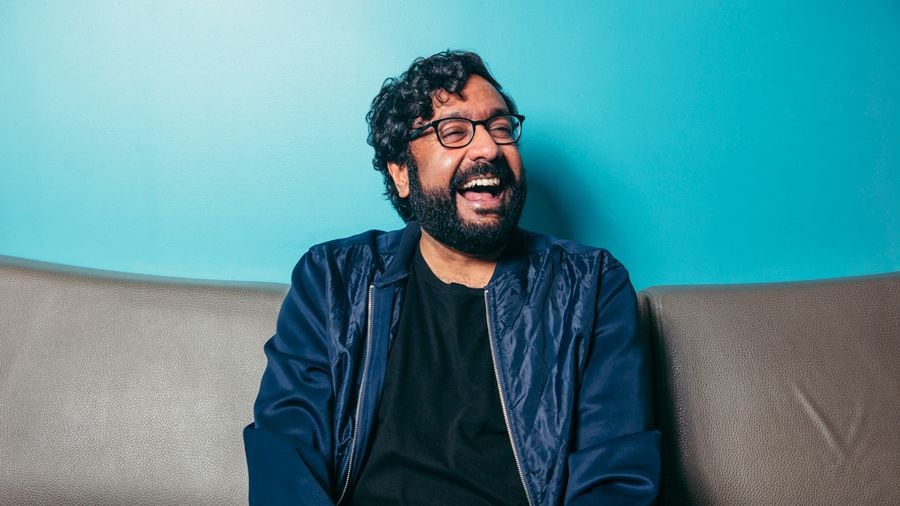
Hari Kondabolu. (Rob Holysz/)
SFR: Let’s talk about these smaller festivals, or up-and-coming festivals, to be specific. As a comedian who tours a lot, is there a major difference as far as you’re concerned with club work versus festival work? Are grassroots fests valuable to comedians at all levels?
Hari Kondabolu: Theaters are very different things, right? Club work, you know, if you have a following in a town, that’s great, because you’ll have fans in the audience. But there are also just people going to a comedy club because it has the word ‘comedy’ in it, and they assume it’s one thing, but a fest, at least, people, I think, know what they’re paying for. You’re seeing specific performers, there’s some level of curation involved—I feel like that gives people…that helps. It brings self-selected comedy fans, it brings out a wider population. When it happens on television, or a big, famous comic comes through town it’s one thing, [but at festivals], especially for local comics, it’s like, ‘we’re here, too.’
One of the organizers for the fest said that people are more familiar with comedy now because of Netflix and streaming specials. Would you say that’s true?
I do think people are more familiar with it. The big issue before was, when you watched five-minute sets and you assumed it was always going to be polished or that that five minutes was going to be like their whole hour with no sense of pace or stories or different styles mixed in. That didn’t necessarily help, though it brought a lot of people out. With Netflix, you’re building fanbases based on specials. They know what you do, you’ve done an hour, and also I think it teaches an audience that, you know what, standup is a long-form thing. People who casually know it might now know you do full hours. People confuse it with improv, that each time you come up with something new. You see this polished work now, and people understand what it is—it’s a show, it’s a performance, not just a random person babbling in a bar.
Standup is one of those things that should not have any boundaries. It’s a person and a mic, it’s pretty straightforward; what you do with that space, it can be anything. I’m not a big fan of putting boundaries on what the art form can be, because it kind of defeats the purpose. Comedy and tragedy go hand in hand, you can play off one, like if you’re talking about a brutally painful story and you find moments of levity and find the right joke, it takes on more meaning. As a comic, what I hope people understand is there are many different styles of comedy. Comedy can come in short, five-minute sets, an hour, they’re all different, it’s all part of what it means.
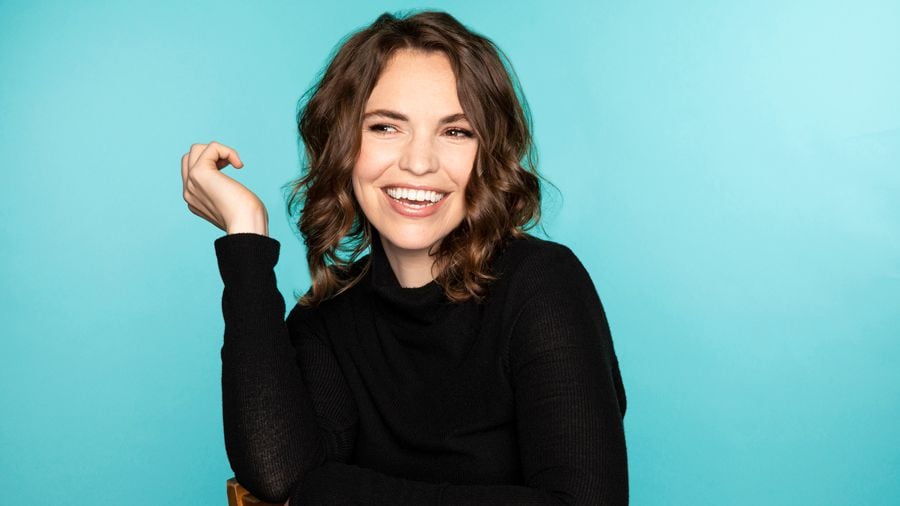
Beth Stelling (Lisa Mierke/)
Speaking of boundaries, I read in an interview from some years back that you found the idea of social awareness having a negative impact on joke-making “ridiculous.” A lot has changed, of course, and it seems audiences are wanting more from their comics. Can we just call this progress, or…? In other words, is it almost like training audiences to want better?
There are no real boundaries—there are repercussions, and there always have been repercussions. There aren’t laws that have been passed that have restricted our rights, but the sensibilities of both the market and the individuals have changed. By the market, I mean whether it’s advertisers or clubs—if they’re willing to invest in an act, well, that’s capitalism, that’s not cancel culture. There have been tons of acts who literally were not allowed to perform on certain stages. It’s different now because before, those lines were always drawn by white, cis-hetero men. They defined what is acceptable, what is OK, what we find funny, what we don’t. Now it doesn’t look that way. Now that you have a broader range of people who, especially because of the internet, are spending money on things they want to see…before I don’t think marginalized people had money to spend. Now it’s a thing where this person has $20 to buy this thing or subscribe to XYZ, and you don’t want to lose that base. This is just how culture has always changed with time, this is what happens when more people have voices who were suppressed in the past. It wasn’t like people in the past, when they heard racist jokes, thought, ‘That’s great!’ Now we’ve opened that up so it does have impact. Whenever I hear comics talk about how you can’t say anything—and I’ve heard so many standup bits about political correctness like you can’t say anything—it’s like, you’re saying this in front of an audience. You just said it. What are you talking about?
It’s like when they say Louis CK got canceled? He just won a Grammy! Do certain contingents look down on him? Yes. But is he not making money? If you’ve been ‘canceled,’ it gives you a whole new market of people who buy into the idea of people doing something on edge. There are ways people view you differently. You’re not really being canceled.
I’m curious about your future as a filmmaker. Is this still something that’s on your mind and, if so, what directions do you think you might take?
Of course, I have a ton of ideas for things I’d like to do. But I’m not primarily a filmmaker, so certainly as I think any filmmaker knows, there’s financing, pitching...it’s a lot, but I’m not opposed. I just think if I’m going to do it, I need the time to narrow it down. I don’t see it coming anytime soon, but I’m certainly thinking about other ideas. I like the idea [that] I’m learning something. I like having an impact on pop culture through my art. I didn’t think [The Problem with Apu] was a global story, I didn’t think it was going to be part of high school or grad school curriculum—it’s a pop documentary that was made for TRU TV, the prank network. You don’t think it’s going to evolve into something bigger. My goal has always been, if I’m shifting dialogue, I always assumed it would be through my standup. But to get bigger audiences through that doc is a blessing and a curse: So many people have seen it, but on the other side of it, people forget I’m actually a standup. That’s primarily what I do, and I’ve been doing it a long time.
The dreaded pandemic question: Did you spend that time honing your craft? Seems like a lot of people expected an awful lot from artists over the last few years, but you’re, like, a human person, so…?
It was less the pandemic and more the fact I had a kid—the two of those things together. I wasn’t going onstage, but that meant I got to spend every day with my kid. That first year of his life, I was there. If I had been able to do standup, I think it would have been strange for me knowing my kid is here and I’m not at home. It’s still weird when I travel now. To me, the pandemic was this very bizarre blessing as much as it was this devastating thing. We had a kid and I got to actually experience what Scandinavians experience—spending time with my child. There were opportunities to do stuff online, do shows outside, but before the pandemic I hated performing outside to begin with. And secondly, I don’t want to do Zoom comedy. I like the fact that I’m not the funny guy in the office, the funny guy on the conference call. I took the time to be with my kid and reflect. I haven’t seriously thought about myself outside of comedy in so many years. I think ultimately, when I went back to comedy, I felt really refreshed. I saw it as an art form.
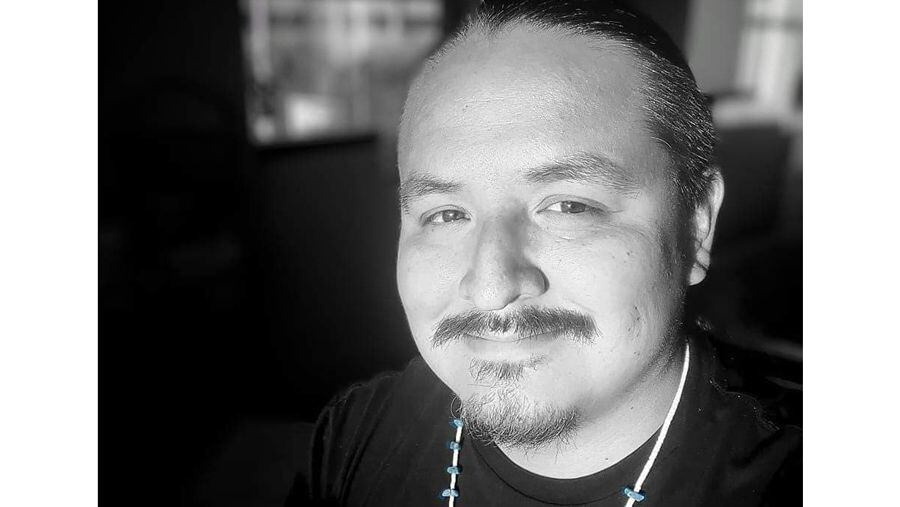
Korey Herrera (Courtesy Korey Herrera/)
Do you think of your work as plotted out, joke for joke, or is it more an organic evolution over time?
It starts as one and then turns to the other. Initially, it starts organically. When British comics plan for the Edinburgh Fringe Fest, and they’re plotting out their hours, they’re going into it with the idea of it being some kind of themed piece. With me, it’s kind of hybrid. I’m looking for the best jokes I have, and that’s not necessarily something I can force myself to write. Once you collect enough pieces, you see patterns, things you want to write about or add. Is it saying something bigger about society as you intended? At a certain stage, I’m plotting and repositioning and fitting the mold, but in the beginning, it has to come from a natural place.
The Way is the Word
By Riley Gardner
Santa Fe isn’t known far and wide for its comedy scene, which might not shock anyone reading this—but the folks who make up the decentralized troupe Wayward Comedy are betting big that we could change that perception and transform the town into a bit of a regional hub that stands proudly with Albuquerque’s ever-growing standup scene.
“Sometimes people call us ‘the nicest mic in the state’,” longtime Wayward member Isabel Madley tells SFR. “A lot of times, when you go to an open mic, it’s comedians working on their material, trying to get better and see what works. We’ve also been called ‘the easiest mic in the state,’ because it’s like under-hand pitches sometimes. Compared to us, Albuquerque is a tough crowd.”
Demanding crowds aside, standup has been a lifelong goal for many of Wayward’s members. Comic Evan Galpert, for example, is one of the “leaders” of the pack insofar as there can be a leader in a fluid, ever-changing organization that doesn’t have much structure. For Galpert, Wayward has been the tonic against what he calls a “all-consuming kind of life;” that capitalist hell of work-rest-repeat. It’s comedy, not work, that’s given him a new kind of satisfaction. His stints in real estate, film and other creative pursuits simply couldn’t compete.
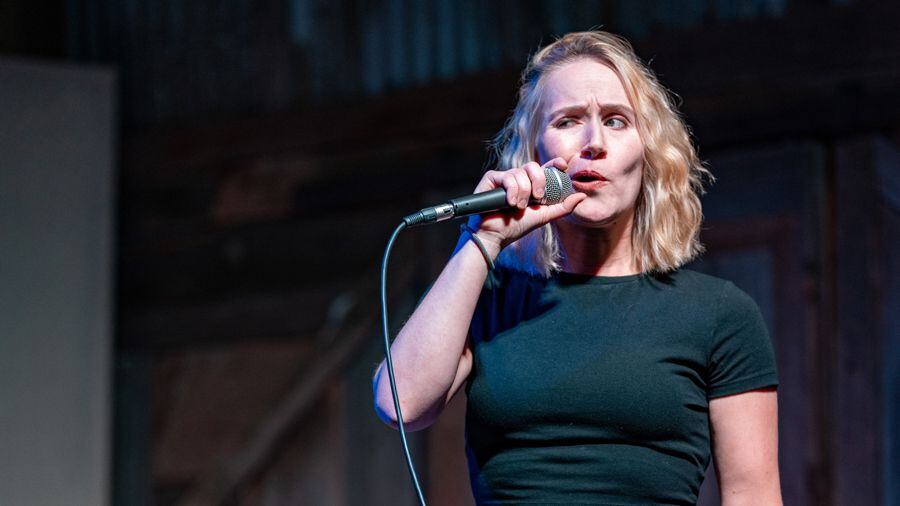
Wayward Comedy’s Isabel Madley says you should try your hand at making people laugh. Unless you’re racist, of course. (Courtesy Isabel Madley/)
“We’ve only been doing [Wayward] for a couple of years, and that’s not a whole lot of time in the comedy world,” Galpert explains. “A couple of us were roommates at a house we called ‘the Baca House of Wayward Boys’—or an orphanage for adult alcoholics, we also called it. We all desperately wanted to do something creative together, and five-minute sets were the only kind of momentum we could find. In between shifts at Trader Joe’s, it just continued to grow.”
After a few practice sessions with an expanding group, he figured they were actually funnier and more clever than they originally expected—though, Galpert notes, their output was probably terrible looking back. Wanting a shot for the group in a public setting, he nervously approached the Chile Line Brewery for a night or two where they could do public standup. Six years later, the Wednesday night standup events are still going strong and have become a critical spot for wannabe comics to hone their skills.
“We needed to put that show together,” Galpert continues. “We needed to do that as a group. Since then, it’s been anyone else who wants to come into the group. It keeps growing, like a Little Shop of Horrors situation. And it grew way more than I ever anticipated.”
The growth has expanded to include events with Santa Fe Improv (which will also have a presence at CloudTop), the Jean Cocteau Cinema, the Santa Fe Playhouse and, of course, the upcoming CloudTop Comedy festival. Reaching those heights requires someone a little detail-oriented. Enter Ryan Lawless, the details guy—the comic who is just as worried about how the speakers are working and how the lights are affecting the audience as he is about his jokes.
“I definitely appreciate comedy, but I know how many ways the house of cards can come crashing down, so I wanted to make sure it keeps on going,” Lawless says. “I’m trying to be the ears of the group—making sure the future goals we all have come together. But the burnout is real. I don’t think a lot of people realize that. It’s really, really real. There’s a lot of projections in comedy.”
Madley concurs. In a large group of comedians with competing egos, keeping it together while aligning with the Wayward ethos is key.
“First the priority: stay friends. Second: put on a show,” she says. “I think providing more services for the community is something Wayward is looking at. We look at ourselves as a production company/entertainment company. Santa Fe could be as big a market as Albuquerque because we’re already an art town. People are really trying to make our theater scenes here match a national level of professionalism. That’s why we’re committed to Wayward being a communal thing, rather than putting any of us in charge. There’s no reason why the comedy scene shouldn’t be as big as the music scene.”
Lawless even has a few ideas for up-and-coming comics.
“My number one rule has always been that within the first 30 seconds, you’ve got to have the audience laughing with your joke,” he says. “Choosing which goes first is critical. You want to kill them. You can do whatever else after.”
“Go out and support people, your local comedians!” Madley adds. “Go out there at [Chile Line] and try—unless you’re racist.”
CloudTop Comedy Festival: 4 pm-10:45 pm Friday, Sept. 15; 3:30-10:45 pm Saturday, Sept. 16; 4 pm-10:45 pm Sunday, Sept. 17. Various locations throughout the Railyard. Free-$150. cloudtopcomedy.com